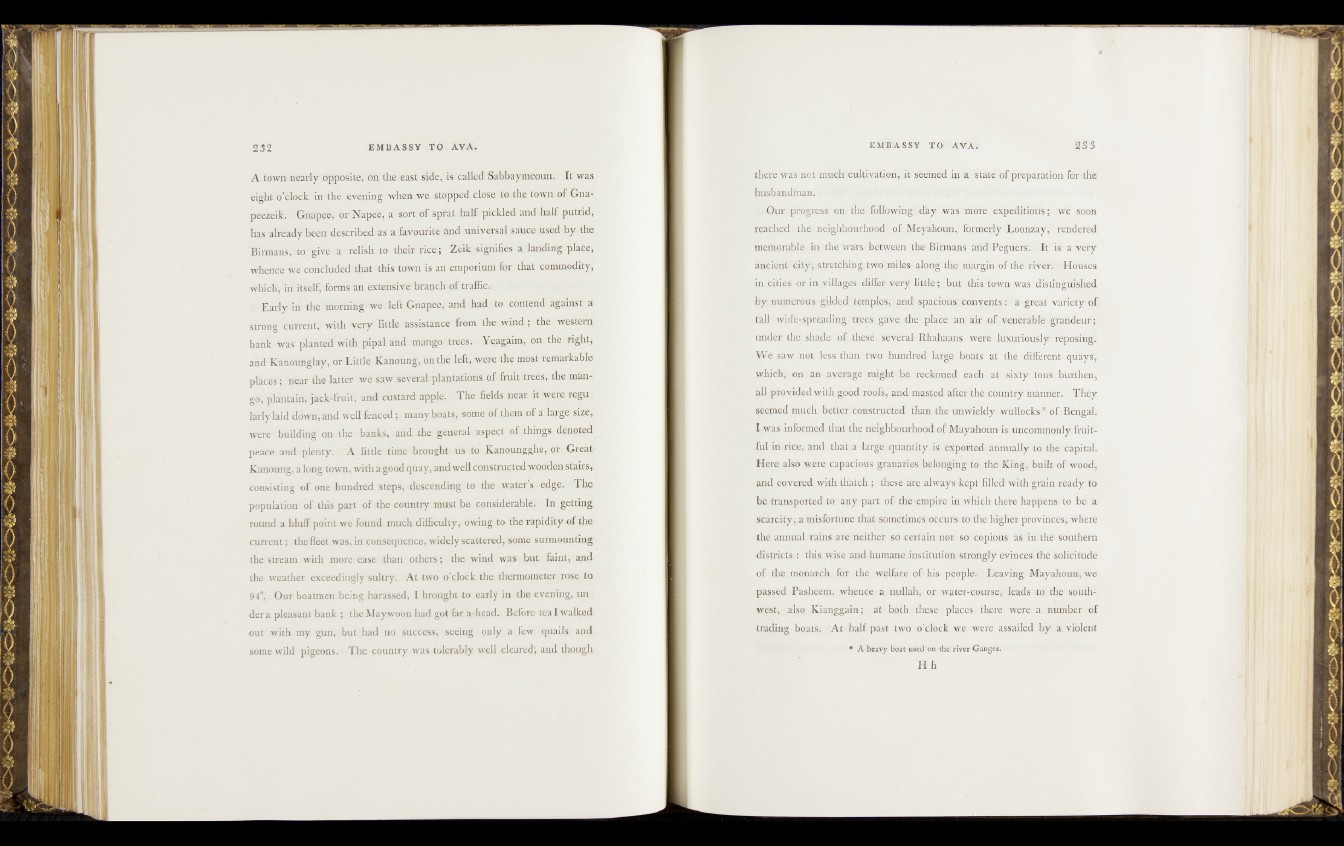
A.townlnearly .d^osMe^on the.’easbsS»fJ.te,t i® GrifedlSabhaymepuhsi It was
eight‘o'clock iri»&e-'evening-wherilwe s tbp^'e^b'cSdse'’to- theitown'of.Gna-
peezeik.’ Goapee,- 'or-Napee^ bStsortrof spratfhalf piekled and.half putrid;
has alreadyheefrdnseribed as afaVourite-and universal «aSj.ce used by-the
Birmans, tcg'give fa .--relish to their1-rice; Zeik (signifies- a- landing! place,
whence we concluded that this town 3s an emporiupj-fer that commodity;
which, in itself, forms an extensive branch of traffic.
. Early in the. Morning we left Gnapee, and Had>- to contend-agrinsi a
strong current,1 with very little assistance from the wind ; the western
bank was planted with pipal and: mango;, trees. -¥eagaim; on the right,
and Kanouhglay, or Little Kanoung, on the left, were the rriosV remarkable
places; near the latter we saw several plantations of fruit tides, thermhhsi
||f plantain, jack-fruit, and custard apple. The fields near it were regu
larlylaid down, and wed fenced; many boats, some of. them of a large size,
were building on the banks, ancLthe general aspect of things denoted
peace and plenty. A little time brought us to Kanoungghe, or Great
Kanoung, a long town, with a good quay,-and well constructed wooden stairs,
consisting of one hundred steps, descending to the water s edge. The
population of this part of the country must be considerable. In getting
round a bluff point we found much difficulty, owing to the rapidity of the
current; the fleet was, in consequence, widely scattered, some surmounting
the stream with more ease than others f theVyind was but faint, and
the weather exceedingly sultry. A t two o’clock the-thermometer;rose to
94°. Our boatmen being harassed, I brought to early in the evening, un
der a pleasant bank ; the Maywoon had got far a-head. Before: te a l walked
out with my gun; but had no success, seeing only a few. quails and
some wild pigeons. The country was .tolerably well cleared’, and though
there wasmotjaStateh cultivation,!it seemed hr-ai staterOffprepayation for the
husbandman..-!
Our progress on the following:.day was more expeditious; we soon
reached the neighbourhood of Meyahoun, formerly Loonzay, i rendered
m'emprable -in'^hlswaritj^t^en'.theBlMnan^'alS’daPegnf^s^ .It is- a very
a^siejflh city?iSf}et.cffihgEksfemil©S^hng"fbh|fhargiU(Qfrlfi$i'ri,vhrfcHouses
in Q ^ ^ q^i^-jvillagesjtdiSBr'YiCiiy little ;-*hfrt this town was distinguished
b y pipn'erpils -ghd^dhtemitle^'handt;spa^}oujqcdnvhqhj;i'4}'gPeat';V-arietp of
till ^ d e sp read in g trees gqic, tfic. pi iu, an* dir o l‘,vehq- lblu gumdcur;
'undpflthp' ^ y ^ '^ ith e g e ^ e iv e i^ k i I^hahhans:;were ffi-xuriqUsl|}- >r.epo'singt
Wej|(Sf|Fvv;niait,'lesst-than two'-' hundred^Ltrguhboits1* au'tlfc tbILruu« quVs,
which’,«» onaiin laverage^mighthhenreokonedi dahl%3t sixty toh^burtherih
#i^®8Yi#ediwshhsgoad3ro®% and-'mas^efh'afteirthe.'courigsyiim-anheK ,®hey
spemed mughihetter' constructed than the unwieldy wullockb‘*> off Bengal:
Lwasdpformed.that the neighbourhood of Mayfahduuasiuncommonl^friii|i
ful in-rice, f and, that* a large quantityussexp'ortedi arirpitfalhytto: thecbapifeh
Idue also capacious giatiai-ies bolongingitb tin. Kings built1 oh wbudg:
and covered-;with.thatch p the's^hre alwaysfkepTfilfedf With grain* ready to
betransportetfetosanyipart of the empiic in whichithuc happens t(5 htlt'it
scarcityga’misfortune that sometimes Occur s-ththe highertproviriGesf where
ilbeBmnnal rainsfardiheither so .cert'affirno.rs’s^tefepih'ti&.as'-in the« southern
districts:: th is wfosteri humahednstiturio&-sft®hgIyvdvincesSfee Solicitude
oh ,th'e. monarch for the .welfare oh his peopleuirLeaving-sMayahounf we
passed Pasheem, whence"a*nullah(; or-.water-course^feread's4 to-the' southwest,
also Kianggain; at both:.these:'places- there wfer^a-jhumber of
trStJing b©at^. : At half past two o’clock we weri assailed l^ i aisYl&tent
* A heavy boat used on the river Ganges, 'in*.
M SH